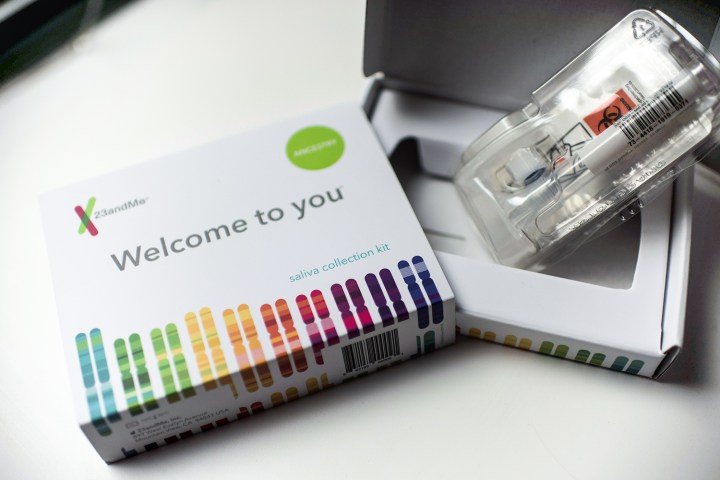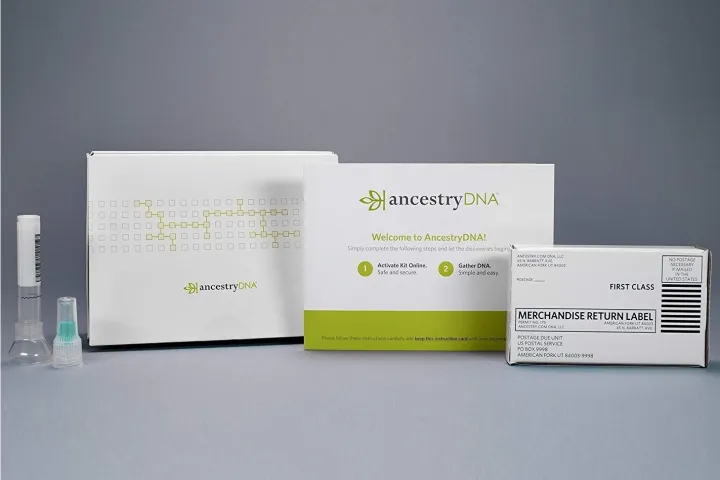Despite the fact that tons of competitors have sprung up in recent years, 23AndMe still makes the best DNA test on the market. It’s the quickest, it’s very comprehensive, and the way the company presents your genetic data is simple and easy to digest. However, depending on what kind of information you’re looking for, there are other, more specialized DNA tests that might be better suited for you. Whether it’s ancestry, disease risk, or something else entirely, there’s likely a DNA kit that’ll uncover that data.
23andMe Ancestry and Health DNA Test
Best DNA test overall

Why should you buy this: 23andMe pioneered the at-home DNA test, and it has only improved with time.
Who it’s for: Those looking for a comprehensive look at their DNA
Why we picked 23andMe:
We are most impressed with 23andMe’s speed. While prefacing this with the fact that we received and sent out our test during a period where the company wasn’t running any kind of special, it only took 15 days for us to receive our results in the mail, nearly a week faster than anyone else we tested.
23andMe also gets high marks for how it lays its results out. They’re easy to follow, and while perhaps less specific than runner up AncestryDNA, they still feel precise. We understand there is some disagreement on the accuracy and validity of using DNA to predict geographic ancestry, but for us, our DNA ancestry matched what we knew (with a few surprises).
The health risks test seems to be worth it if you’re concerned about your risks for genetic diseases. If you’re having a child and worried about passing along genetic diseases, you’ll find the carrier section pretty useful.
Of course, there’s some less useful but fun-to-know items like genetic and wellness traits. Overall, the test feels like a good value.
For its comprehensiveness and value, the 23andMe Ancestry and Health kit is our top pick.
AncestryDNA: Genetic Ethnicity Test
Best DNA test for ancestry

Why should you buy this: AncestryDNA only tests for what its named for, but the results are very detailed.
Who it’s for: Users interested in genealogy will find this extremely helpful.
Why we picked AncestryDNA:
It’s not surprising Ancestry got into the at-home DNA test market, considering the company’s entire business has been built around helping millions research their family ancestry. It’s probably also for this reason the company’s test only tests for that,and does it extremely well.
It took 20 days from the date we dropped it in the mail to have our results ready, and the results were in line with what we expected. Whereas 23andMe opted for “broader” regions (i.e. French and German, Eastern European), in some cases AncestryDNA offered more specific regions, including picking up on this writer’s heavy German ancestry.
Where AncestryDNA especially shines is in its ability to link you with common genetic ancestors. As more Ancestry customers take these tests, you may be able to find ancestors that you didn’t know you had, or fill in gaps in your tree – especially in cases where your ancestral homelands didn’t keep good records (23andMe does this too, but we feel AncestryDNA does it better).
You’ll also be able to trace migration in a more detailed way than 23andMe provides, thanks to Ancestry.com’s massive genealogical database.
If health is not a concern to you, AncestryDNA’s service might be a better option, and definitely so if you’re already using the service for family tree research. There is a bit of a longer wait, but it’s more than worth it for the detail.
Vinome DNA Test Kit: Wine Explorer
Best novelty DNA test

Why should you buy this: It’s the most unique DNA test that we’ve seen yet.
Who it’s for: Wine lovers, of course.
Why we picked Vinome:
As admitted winos ourselves, we jumped at the chance to try out a DNA test that supposedly can help you select wines better suited for your palate.
When you begin you’ll be asked some questions on what flavors you prefer (and even what cheeses you like – who doesn’t like their wine with a little cheese!). From there, those preferences are combined with results of your analysis to help you choose the best wines.
We were pleasantly surprised to see what we knew of our preferences be reflected in the results (an affinity for sweeter and citrusy wines, white over red), and actually got recommendations for two types of wines we haven’t tried yet, pinot gris and viognier – which we’ll have to run to the store to pick up and try out soon.
While occasional wine drinkers may not find Vinome that useful, we’d more than recommend this to seasoned drinkers. It just might make those trips to the wine store a little less stressful.
How We Test
Testing these kits out takes a lot of spitting into test tubes, but we feel with the ever-increasing number of DNA tests out there, it’s time that someone took a hard look at these offerings to help you decide if they’re a wise investment. DNA analysis is an evolving science though, and there’s a lot we don’t know about the human genome just yet.
This makes testing a bit of a challenge, however we use a combination of comparison tests matched with our expectations of the end results to select which tests are the best.
Does the test make sense? Is it too overly broad or do the results seem skewed in any way? Is the test easy to perform? Do the results take a long time to process? All these kinds of questions are ones we’re looking to answer.
Of course, usefulness is also a key factor. There’s a plethora of information in your genome, not all of which is particularly useful. Does the DNA test give you any actionable information to better yourself on, or is a particular unique test? It just might make it on this list.